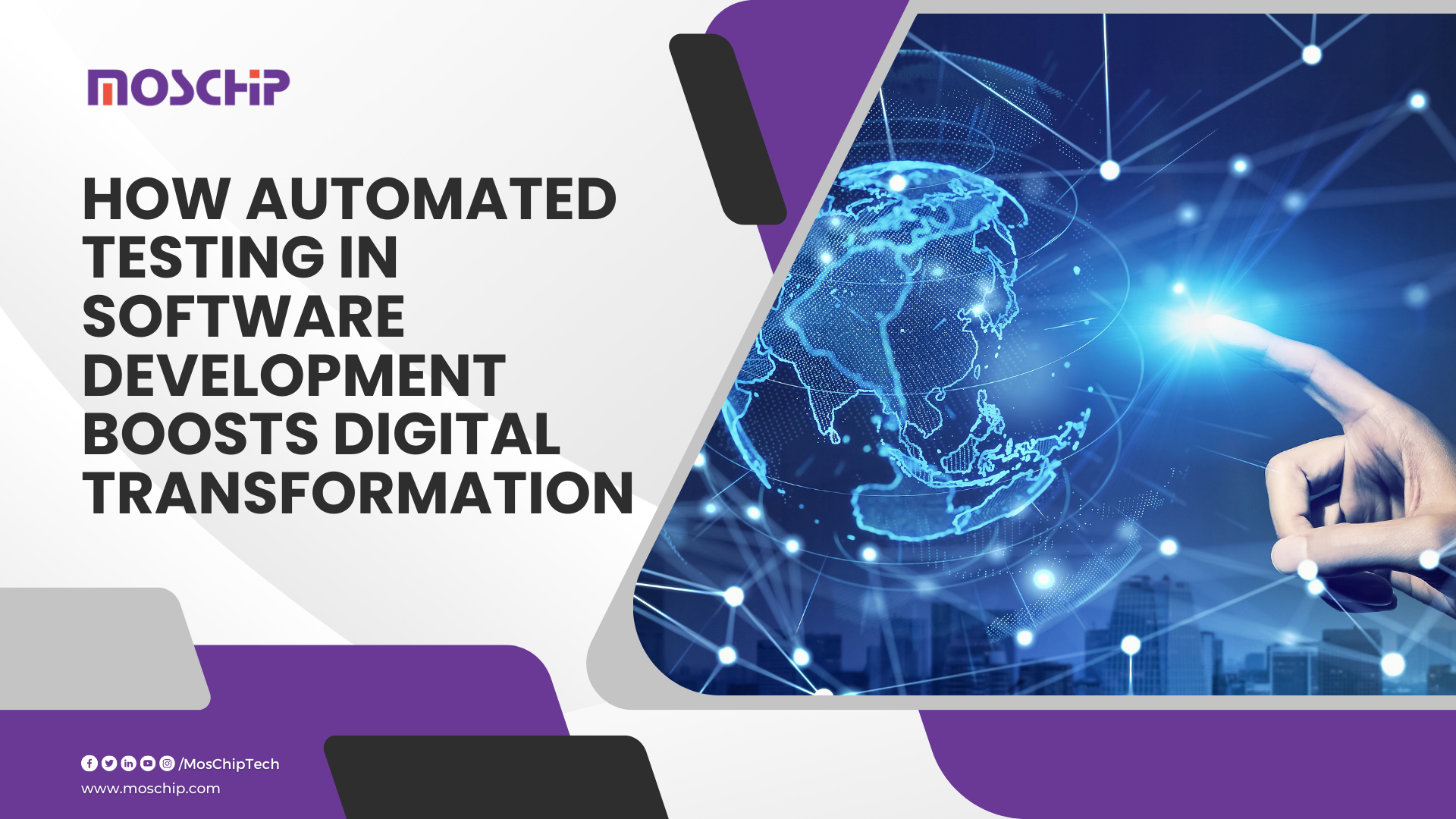How automated testing in software development boosts Digital Transformation
 Automated testing in digital transformation
Automated testing in digital transformation
Benefits of automated testing in digital transformation
The several benefits of automated testing plays in Digital transformation are as follows:
- Faster time to market: Automated testing may significantly reduce the testing time, allowing one to bring new features and changes to operations faster. This is critical in continuously changing the digital landscape where speed and agility are important for staying competitive.
- Better quality: Automated tests may be run consistently and repeatedly, ensuring that software programs comply with the quality standards that are needed. This helps to detect and address concerns early in the development phase, reducing the possibility of major post-deployment errors.
- Continuous Integration and Delivery: Automated testing is an essential component of effective Continuous Integration (CI) and Continuous Deployment (CD) pipelines. One needs to establish seamless integration and deployment pipelines by automating the testing process, making the software development lifecycle more agile and responsive.
- Increased test coverage: Automated testing allows for the execution of a broader range of test scenarios, including those that are difficult to execute manually. This wide test coverage helps in identifying and addressing a wider range of potential errors, improving the overall quality of the software.
- Improved transparency: Automated testing results are easily shared and integrated into the development process, resulting in improved communication between the development, testing, and operations teams. This transparency can also help in identifying bottlenecks and optimizing the overall software development lifecycle.
Test automation approach: Different test automation methodologies are required for digital transformation activities to ensure the quality, reliability, and functionality of software systems. Each strategy makes an individual contribution to digital transformation. Here’s how each test automation strategy might benefit digital transformation efforts.
- Regression testing: This approach ensures that new features or changes introduced during digital transformation efforts do not negatively impact existing functionalities. This approach helps in maintaining the stability and reliability of the software.
- Unit test: Unit testing is a crucial component in developing stable and maintainable software solutions for digital transformation projects. It checks the behavior of individual code components.
- Smoke testing: This approach quickly validates the application’s basic functioning after each build, providing immediate input on whether additional testing is required. This technique enables quick iterations and deployments, which are essential in digital transformation.
- API and Integration tests: To validate the interactions and integrations between different components, services, and systems, this approach ensures seamless communication and interoperability. This is critical for digital transformation initiatives that involve complex architectures and ecosystems.
- User interface testing: It guarantees that the application’s user interface works as intended, offering a fluid and easy user experience, which is important in promoting user adoption and satisfaction in digital transformation projects.
- Input and output testing: This testing evaluates input data processing and output data production, ensuring data accuracy, dependability, and integrity. This is critical for data-driven digital transformation efforts.
- Security tests: Security testing looks at the software application’s security posture, identifying and preventing possible threats and vulnerabilities, protecting confidential information, and ensuring compliance with security standards and regulations that are essential for secure digital transformation.
- Performance tests: This method evaluates the performance and scalability of the application under various conditions, helping optimize resource utilization, enhance user experience, and ensure the application can handle the increased workload and traffic associated with digital transformation.
- Acceptance tests: This approach verifies that the software meets the specified requirements and acceptance criteria, ensuring alignment with business objectives and user expectations. It validates the success of digital transformation initiatives in delivering value to stakeholders.
The future of automated testing
Automated testing will play a bigger role as digital transformation continues to transform industries and change business paradigms. Developments in Artificial Intelligence (AI) and Machine Learning (ML) will also improve test automation capabilities by allowing autonomous testing, predictive analysis, and intelligent test production.
To sum up, automated testing ensures that software solutions are scalable, agile, and reliable, which enables organizations to accomplish their strategic goals. It also stimulates digital transformation. Businesses that include automated testing in their digital transformation process will have a competitive advantage that will help them stay ahead of the competition in today’s changing market, develop more quickly, and provide better customer experiences.
MosChip delivers world-class product engineering/system software and semiconductor design solutions. In a landscape where precision and efficiency are paramount, MosChip’s commitment to excellence is the compass guiding the digital transformation in every industry.
About MosChip:
MosChip has 20+ years of experience in Semiconductor, Product Engineering services & Software, security with the strength of 1300+ engineers.
Established in 1999, MosChip has development centers in Hyderabad, Bangalore, Pune, and Ahmedabad (India) and a branch office in Santa Clara, USA. Our software expertise involves platform enablement (FPGA/ ASIC/ SoC/ processors), firmware and driver development, systems security, BSP and board bring-up, OS porting, middleware integration, product re-engineering and sustenance, device and embedded testing, test automation, IoT, AIML solution design and more. Our semiconductor offerings involve silicon design, verification, validation, and turnkey ASIC services. We are also a TSMC DCA (Design Center Alliance) Partner.


Automated testing in digital transformation
Benefits of automated testing in digital transformation
The several benefits of automated testing plays in Digital transformation are as follows:
- Faster time to market: Automated testing may significantly reduce the testing time, allowing one to bring new features and changes to operations faster. This is critical in continuously changing the digital landscape where speed and agility are important for staying competitive.
- Better quality: Automated tests may be run consistently and repeatedly, ensuring that software programs comply with the quality standards that are needed. This helps to detect and address concerns early in the development phase, reducing the possibility of major post-deployment errors.
- Continuous Integration and Delivery: Automated testing is an essential component of effective Continuous Integration (CI) and Continuous Deployment (CD) pipelines. One needs to establish seamless integration and deployment pipelines by automating the testing process, making the software development lifecycle more agile and responsive.
- Increased test coverage: Automated testing allows for the execution of a broader range of test scenarios, including those that are difficult to execute manually. This wide test coverage helps in identifying and addressing a wider range of potential errors, improving the overall quality of the software.
- Improved transparency: Automated testing results are easily shared and integrated into the development process, resulting in improved communication between the development, testing, and operations teams. This transparency can also help in identifying bottlenecks and optimizing the overall software development lifecycle.
Test automation approach: Different test automation methodologies are required for digital transformation activities to ensure the quality, reliability, and functionality of software systems. Each strategy makes an individual contribution to digital transformation. Here’s how each test automation strategy might benefit digital transformation efforts.
- Regression testing: This approach ensures that new features or changes introduced during digital transformation efforts do not negatively impact existing functionalities. This approach helps in maintaining the stability and reliability of the software.
- Unit test: Unit testing is a crucial component in developing stable and maintainable software solutions for digital transformation projects. It checks the behavior of individual code components.
- Smoke testing: This approach quickly validates the application’s basic functioning after each build, providing immediate input on whether additional testing is required. This technique enables quick iterations and deployments, which are essential in digital transformation.
- API and Integration tests: To validate the interactions and integrations between different components, services, and systems, this approach ensures seamless communication and interoperability. This is critical for digital transformation initiatives that involve complex architectures and ecosystems.
- User interface testing: It guarantees that the application’s user interface works as intended, offering a fluid and easy user experience, which is important in promoting user adoption and satisfaction in digital transformation projects.
- Input and output testing: This testing evaluates input data processing and output data production, ensuring data accuracy, dependability, and integrity. This is critical for data-driven digital transformation efforts.
- Security tests: Security testing looks at the software application’s security posture, identifying and preventing possible threats and vulnerabilities, protecting confidential information, and ensuring compliance with security standards and regulations that are essential for secure digital transformation.
- Performance tests: This method evaluates the performance and scalability of the application under various conditions, helping optimize resource utilization, enhance user experience, and ensure the application can handle the increased workload and traffic associated with digital transformation.
- Acceptance tests: This approach verifies that the software meets the specified requirements and acceptance criteria, ensuring alignment with business objectives and user expectations. It validates the success of digital transformation initiatives in delivering value to stakeholders.
The future of automated testing
Automated testing will play a bigger role as digital transformation continues to transform industries and change business paradigms. Developments in Artificial Intelligence (AI) and Machine Learning (ML) will also improve test automation capabilities by allowing autonomous testing, predictive analysis, and intelligent test production.
To sum up, automated testing ensures that software solutions are scalable, agile, and reliable, which enables organizations to accomplish their strategic goals. It also stimulates digital transformation. Businesses that include automated testing in their digital transformation process will have a competitive advantage that will help them stay ahead of the competition in today’s changing market, develop more quickly, and provide better customer experiences.
MosChip delivers world-class product engineering/system software and semiconductor design solutions. In a landscape where precision and efficiency are paramount, MosChip’s commitment to excellence is the compass guiding the digital transformation in every industry.
About MosChip:
MosChip has 20+ years of experience in Semiconductor, Product Engineering services & Software, security with the strength of 1300+ engineers.
Established in 1999, MosChip has development centers in Hyderabad, Bangalore, Pune, and Ahmedabad (India) and a branch office in Santa Clara, USA. Our software expertise involves platform enablement (FPGA/ ASIC/ SoC/ processors), firmware and driver development, systems security, BSP and board bring-up, OS porting, middleware integration, product re-engineering and sustenance, device and embedded testing, test automation, IoT, AIML solution design and more. Our semiconductor offerings involve silicon design, verification, validation, and turnkey ASIC services. We are also a TSMC DCA (Design Center Alliance) Partner.









